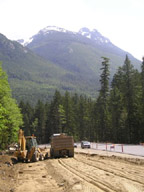GEOTECHNICAL AND MATERIALS ENGINEERING
Program Description
The Geotechnical and Materials Engineering program includes several important disciplines of Civil Engineering associated with the characterization, behavior, design and management of natural particulate materials, infrastructure materials, and pavements. Graduate students may focus their coursework and research in one of these there areas:
Geotechnical Engineering incorporates the characterization and behavior of natural particulate materials for the development of engineered systems and includes the study of soil mechanics, geochemistry, soil mineralogy and foundation design. The Geotechnical group seeks to understand the fundamental phenomena of soil behavior, beginning at the levels of nano- and micro-scale particle interaction, and apply that knowledge to predict macro-scale material response for geotechnical structure design as well as for the development of engineered soil systems.
Materials Engineering involves the design and development of construction materials to meet specific properties and performance criteria. In addition to mechanical properties, durability, sustainability, and cost of materials are of paramount importance and must be optimized. Students use a variety of advanced experimental and computer modeling techniques to characterize and simulate the microstructure, properties, and degradation of materials such as portland cement concrete, asphalt concrete, fiber-reinforced composites, metals, wood, and aggregates. Typical research subjects could include development of high performance, recycled, and energy efficient materials; characterization and modeling damage progression in materials due to service loads (e.g., traffic), extreme events (e.g., blast), and natural deterioration (e.g., steel corrosion); and rehabilitation and strengthening of existing structures using novel repair materials.
Pavement Engineering includes the characterization, design and analysis of pavement materials, including asphalt concrete, portland cement concrete, aggregate bases, and subgrade soils. Pavement design includes the selection and specification of appropriate materials, layer thicknesses, surface conditions, and drainage features for the needed traffic and environmental conditions. The pavement engineering program also includes pavement asset management, which incorporates a system approach to a the long-term inspection, evaluation with both destructive and nondestructive testing, maintenance, rehabilitation and resource allocation for the pavement performance.

